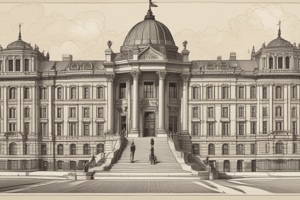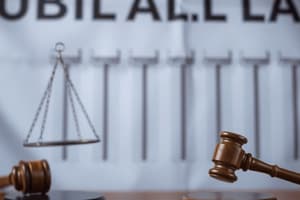Podcast
Questions and Answers
What is the legal basis of Judicial Review?
What is the legal basis of Judicial Review?
- Order 53 of the Civil Procedure Rules
- Traditional common law power to review government action (correct)
- Section 149 of the Equality Act 2010
- Wandsworth LBC v Winder
What is the purpose of the permission requirement in Judicial Review?
What is the purpose of the permission requirement in Judicial Review?
- To ensure the claimant has a good understanding of the law
- To allow the claimant to amend their claim
- To protect public authorities from unmeritorious claims (correct)
- To delay the judicial review process
What is the principle that restricts Judicial Review to public law matters?
What is the principle that restricts Judicial Review to public law matters?
- Democratic legitimacy
- Human rights exclusivity
- Substantive exclusivity
- Procedural exclusivity (correct)
In which case did the court rule that a private law claim was an abuse of procedure and should be struck out?
In which case did the court rule that a private law claim was an abuse of procedure and should be struck out?
What is the exception to the exclusivity principle?
What is the exception to the exclusivity principle?
Which tribunal has been given the power of Judicial Review?
Which tribunal has been given the power of Judicial Review?
What is the primary consideration for a decision maker in ensuring fair procedures?
What is the primary consideration for a decision maker in ensuring fair procedures?
What is the purpose of the Common Law Duty of Fairness?
What is the purpose of the Common Law Duty of Fairness?
What is the significance of the case of Durayappah v Fernando in the context of the duty of fairness?
What is the significance of the case of Durayappah v Fernando in the context of the duty of fairness?
What is the consequence of a public body not following a statutory procedure?
What is the consequence of a public body not following a statutory procedure?
What is the underlying principle of the duty of fairness in public law decision-making?
What is the underlying principle of the duty of fairness in public law decision-making?
What is the main purpose of discretionary powers given to public bodies?
What is the main purpose of discretionary powers given to public bodies?
What is the key principle of the Wednesbury principle?
What is the key principle of the Wednesbury principle?
What was the main argument made by Coughlan in the R (on the application of Coughlan) v Minister for the Cabinet Office case?
What was the main argument made by Coughlan in the R (on the application of Coughlan) v Minister for the Cabinet Office case?
What is the significance of the R (on the application of Coughlan) v Minister for the Cabinet Office case?
What is the significance of the R (on the application of Coughlan) v Minister for the Cabinet Office case?
What is the relationship between discretionary powers and public policies?
What is the relationship between discretionary powers and public policies?
What is the purpose of judicial review in cases of public decision-making?
What is the purpose of judicial review in cases of public decision-making?
Flashcards are hidden until you start studying
Study Notes
Discretionary Powers
- Discretionary powers cannot be delegated
- Public bodies can adopt policies to make decisions and provide guidance, but policies must be lawful
Judicial Review (JR)
- R (on the application of Coughlan) v Minister for the Cabinet Office: introduction of voter ID pilot schemes was legal under section 10 of the Representation of the People Act 2000
- JR is not a merits review, focuses on the process, not the decision itself
- Grounds for JR: illegality, irrationality, procedural impropriety
Irrationality and Procedural Impropriety
- Irrationality: the decision was so unreasonable that no reasonable decision maker could have come to the same decision (Wednesbury principle)
- Procedural impropriety: whether the decision was made properly and fairly
Public Law and JR
- Public law matters can only be pursued by way of JR
- JR is restricted to public law (‘procedural exclusivity’)
- Exceptions to the ‘exclusivity principle’: civil/private rights also arise in the case, but these are not being pursued through JR
Upper Tribunal and JR
- Upper Tribunal has the power of JR of certain tribunals
- JR depends on the nature of government powers
Statutory Procedural Requirement and Common Law Duty of Fairness
- Statutory Procedural Requirement: is there a procedure laid down in statute?
- Common Law Duty of Fairness: used when there is no procedure in statute, 3 steps:
- Existence of The Duty of Fairness
- Level of Duty Owed
- Content of duty
Studying That Suits You
Use AI to generate personalized quizzes and flashcards to suit your learning preferences.




